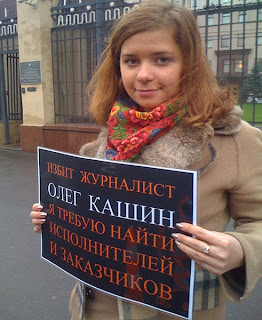 |
| 'If one good deed in all my life I did, I do repent it from my very soul' said Aaron the Moor |
Rape, murder, human sacrifice and cannibalism are the last things you'll associate with William Shakespeare, and yet, that's what Titus Andronicus is about.
In essence, the plot is the revenge of Titus Andronicus, the glorious Roman general who lost 22 sons to conquer the Goths, against the villainous Aaron, sadistic Chiron and Demetrius and the scheming Tamora (Queen of the Roman Emperor).
The violence starts when Titus insisted on taking Alarbus as sacrifice for his 22 lost sons in the war, despite a strong pitiful plead from the mother - Tamora. Aaron, out of pure vice, plotted with Chiron and Demetrius - Tamora's remaining sons, to put Titus' two sons to deaths and to get Lavina raped and have her tongue and hands cut off - as an attempt to prevent her uttering the rapists' names.
Titus eventually found Chiron and Demetrius as the wrongdoers. He killed them, ground their bones, mixed their blood and meat into paste, and served it to their mother at banquet. Aaron was later buried and starved to death.
The distinction between the civilised Roman and barbarous Goth blurred. Titus' killing Alarbus as sacrifice, then serving the sons' cooked flesh to mother is no less horrible than Demetrius and Chiron raping and then mutilating a girl they supposedly love.
Like the love of Romeo and Juliet and indecisiveness of Hamlet, Shakespeare's Titus Andronicus presents yet another universal life theme: the endless cycle of revenges. When Titus started the human sacrifice, the whirlpool of revenges begins to draw everyone in
This whirlpool of revenges, along with the blurred line between civilisation and barbarism, bear such striking relevance to today context that once again proves the timelessness of Shakespeare. American involvement in the Middle East, notably the support for the repressive Bahrain, and the subsequent pursue of the al Qaeda only serve to remind me of Titus and the Goths.
'Justice has been done' said Barack Obama to the killing of Osama Bin Laden. I doubt that.
Indeed, the point here is not justice as such but the endless rounds of revenges that trap people into a quagmire.
Forgive and forget is easier said than done. But that's what Titus Andronicus warned us to do.

